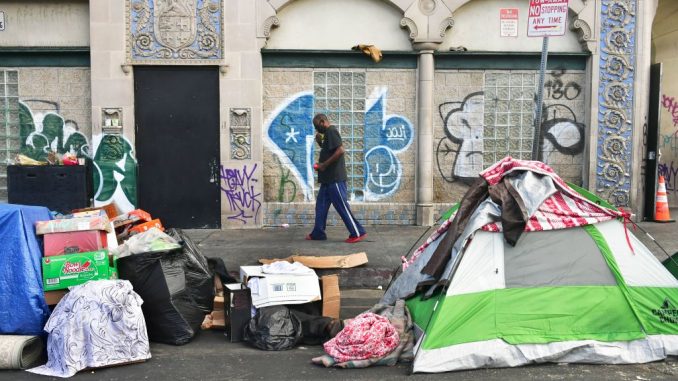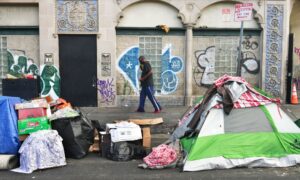

LOS ANGELES—A coalition of civic leaders called May 19 for the city and county of Los Angeles to create an independent entity to address the homelessness crisis through data, measurable outcomes and greater accountability.
The “Homelessness Governance in Los Angeles: Centering the System” report was commissioned by the Committee for Greater L.A. in partnership with the University of California–Los Angeles Luskin School for Public Affairs and the University of Southern California Equity Research Institute.
It asserts that Los Angeles’ governance problem stems from the lack of a central entity to address the problem of homelessness, and calls for officials to create one.
The report notes that while the Los Angeles Homeless Services Authority (LAHSA) is a shared city-county agency, it “was never designed nor has it evolved into the kind of entity that can knit together the fragmented threads of L.A. governance in homeless policy.”
“We actually have too much leadership, all too often scattered and freelancing; too much data, not forged around outcomes; too much informal, unaligned coordination,” according to the report, which was authored by Raphael Sonenshein of the Pat Brown Institute for Public Affairs at Cal State Los Angeles.
“Formal city-county collaboration, as currently devised, is too inconsistent to carry the community’s effort in the long term. We definitely need more money and should improve existing institutions, but we most truly need alignment of money and institutions around a common mission with agreed-upon and impactful outcomes.”
The report called for an independent entity, called “the Center,” led by a chief executive, governed by a board of mostly elected officials, and overseen by community stakeholders to address the region’s homelessness crisis.
About 568,000 people in the United States are experiencing homelessness, with 151,000 in California; 66,436 in Los Angeles County; and 41,290 in Los Angeles, according to LAHSA’s homelessness count last year. This year’s count was canceled due to the COVID-19 pandemic.
The Center would first develop a well-designed mission and outcomes plan, according to the report.
“From there it will work nonstop to be the voice of the Los Angeles homelessness effort, keeping the community informed, and advocating for new policies to address not just the symptoms but the underlying policy causes of homelessness,” the report stated.
The Center’s functions would include: strategic planning, including through a five-year plan focused on a common mission and measurable goals; measurable outcomes that would include not only goals for the unhoused and unsheltered, but for racism and racial inequity that have contributed to the homelessness crisis; and advocating for policy changes at the federal and state levels.
“The proposed entity brings together those who can bring their own strengths of power and influence: whether formal government authority, philanthropic resources, community recognition, and support, lived expertise, and research, to form a collective unit capable of truly centering the mission of addressing homelessness in Los Angeles,” Sonenshein said in a statement provided by the Committee for Greater L.A.
“The entity is structured to fit within the fragmented and dispersed system of horizontal power in Los Angeles resulting in a more coordinated and strategic approach.”
City Councilmember Mark Ridley-Thomas issued a statement May 19 lauding the proposal.
“At a time when residents and voters are registering the topic of homelesness as their top-tier concern, unprecedented state and federal dollars are being aimed at the moral crisis on our streets, and a federal judge threatens to upend our response system, a slew of reports on governance are indicative of the general discontent with the status quo,” Ridley-Thomas said.
“Dr. Sonenshein’s report, on behalf of the Committee for Greater L.A., provides a clear-eyed analysis of the factors that complicate our collective response to the most compelling crisis confronting Los Angeles namely, homelessness.”
Ridley-Thomas went on to say, “The lack of established consensus among multiple institutions around a common mission, goals and outcomes is identified as a major barrier to progress. These will be the thorny discussions that must be tackled with urgency and political will. It will require leadership and facilitated dialogue among all stakeholders, and especially those with lived experience who have the most to lose or gain. The proof is in the pudding, as they say, and I look forward to rolling up my sleeves and getting to work. Indeed, there is no going back.”






Be the first to comment